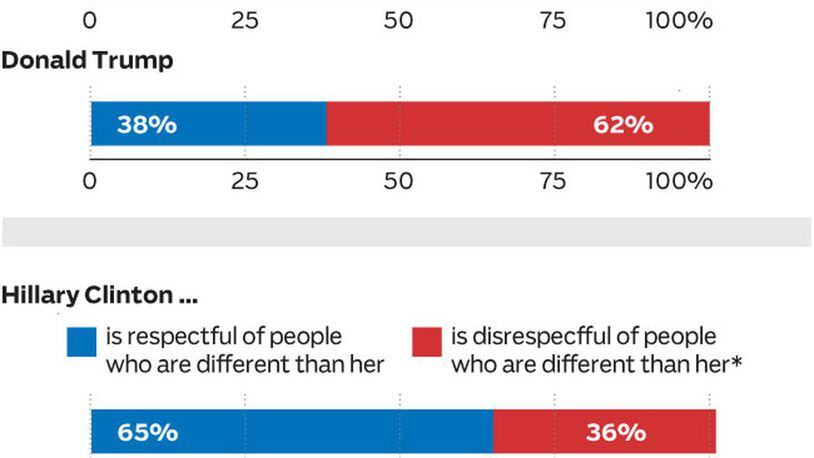Republican Donald Trump was caught on audio tape suggesting he could get away with grabbing women by the genitals because he’s a star. Still, the multi-billionaire has the backing of 38 percent to 48 percent of Ohio voters, depending on the poll.
Democrat Hillary Clinton labeled half of Trump supporters “deplorables” and is viewed unfavorably by more than half the voters in Ohio. Yet she has support from 41 to 45 percent of Ohio voters, depending on the poll.
A new University of Akron poll conducted for this newspaper and other Ohio news organizations found that 77 percent of Ohioans view Trump as disrespectful to people who aren’t like him and 62 percent of voters think he doesn’t care about people like them — stunningly numbers for someone who won the nomination of his party.
Clinton fared better on both questions, though Ohio voters are nearly evenly split over whether she cares about them.
“These data suggest that for a large portion of Americans, respectfulness is not a top priority,” said John Green, director of the Ray C. Bliss Institute of Applied Politics at the University of Akron, which conducted the poll.
Springfield resident Roberta Ober, who described herself as “a deplorable,” said she is willing to dismiss Trump’s hot mic remarks, saying Access Hollywood host Billy Bush set up Trump. She is backing Trump, in part, because she believes he’ll make the right appointments to the U.S. Supreme Court, she said.
“Honestly, I believe that Trump is there for a reason. He is the meanest, toughest one of them all,” Ober said, adding that Trump is able to stand up to what she says are all the “lies and tricks.”
Attitudes about what is acceptable behavior have shifted since 2010, according to a Zogby poll on civility in American politics conducted for Allegheny College. Six years ago, 89 percent of the American public said commenting on another’s race or ethnicity was out of bounds; today, 69 percent deem it unacceptable — a 20-point drop.
More people today find it acceptable to insult or belittle someone, shout over them in an argument or question the patriotism of someone with a differing opinion, the poll found.
In the third and final presidential debate, held Wednesday night in Las Vegas, Trump interjected with “Wrong” when Clinton spoke and and at one point said, “Such a nasty woman!” to describe her. When Clinton said Russian President Vladimir Putin would rather have Trump as a puppet president, Trump retorted: “No puppet. No puppet. You’re the puppet.”
Former state lawmaker Ted Celeste, a Columbus Democrat backing Clinton, is working on a national project called “Revive Civility: Our Democracy Depends on It.” Organizers developed standards of conduct for the candidates and moderators for the Commission on Presidential Debates.
“One of the recommendations was no interruptions. That sure went out the window,” Celeste said. “That used to be a standard folks would follow.”
Green isn’t surprised by the nasty tone and sees it as an extension of what is occurring outside the political realm.
“Our discourse, whether it’s in politics or in social life or on social media, has become increasingly uncivil,” Green said. “I think this year has probably accelerated that trend because of what people have seen modeled among the major candidates and their allies and supporters. Overtime, we’ve seen a decline in respect for one another and in the civility of discourse.”
Trump, who built his national profile as a reality TV star who sneered “You’re Fired” at failed contestants, tried to unnerve his opponents during his presidential run, tossing out nicknames such as “Little Marco,” “Lying Ted” and “Crooked Hillary.”
“He made his reputation in reality TV — an area where there is a lot of brash commentary,” said Green. “In some ways he has brought that style into mainstream politics of a presidential campaign. But people have observed that trend for a while now.”
The rancor of the 2016 presidential election cycle has helped drive the Revive Civility program, Celeste said. The group offers downloadable toolkits that offer steps for injecting civility in politics and everyday life and it is helping grow a national network of citizens who want to change the tone of political discussion in the country.
“It’s out there and it’s starting to make a difference,” Celeste said. “It’s a long haul. It’s not going to happen overnight.”
Some Trump supporters are among those unhappy with the tone of the current campaign, saying both candidates have engaged in name-calling, accusations and lies.
“It’s stupid. They both do it. They’re not even getting to the issues,” said Cathy Mathys of Bellefontaine. “I just don’t like the politics the way that they are. It’s just gotten really ugly.”
About the Author
